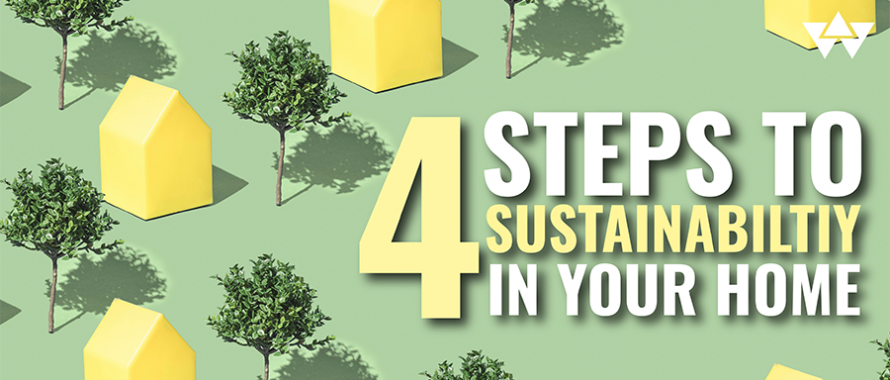With only a few adjustments to your lifestyle, there are many simple ways to increase sustainability in your home that can have lasting impacts on the environment. Consumers are even increasing their awareness of companies' sustainability efforts, and making purchasing decisions to include more sustainable products in their homes.
The principle is straightforward: use less of the earth’s resources, while trying to replenish them.
Did you know?
- According to a Georgetown University Study, Americans throw away enough plastic bottles a week to circle the earth five times. The United States represents only 5% of the global population.
- A study by Circular Ecology, a British environmental consultancy firm, reveals that recycling a single soda can rather than producing the original saves enough energy to power a television for more than three hours.
- A study from Point Park (Pa.) University discovered an incandescent light bulb uses only 10% of the electricity used to light it, The other 90%? Wasted heat!
We’ve compiled a list of ways to get to work on your sustainability efforts now. Starting with one thing at a time can help make these changes feel less overwhelming. Before long, you’ll have a new set of habits for creating a more sustainable home.
4 ways to improve sustainability in your home:
-
DRIVE LESS
Think of places you could bike or walk to instead of driving. Even a few trips saved help the environment. Public transportation is also a great alternative to help with fuel conservation and reducing emissions.
- Think green when buying a car. Use the U.S. Environmental Protection Agency’s calculators to check fuel efficiency.
- Rideshare when possible and cut your personal consumption by as much as half. Check with coworkers and friends and split gas costs.
- Telecommute, when possible. Many companies are open to at least partially remote work in light of the pandemic.
-
RECYCLE MORE
It’s easy to toss cardboard and plastic bottles into the right bin, but what about recyclable items that might otherwise end up in a landfill? Here are a few things you can give new life to that you might not know about.
- Recycle used motor oil. Changing your own oil can save money — and it’s easy to recycle what you replace. Collect used oil in the same containers your new oil was in. Make sure it doesn’t mix with other substances. Check with your local recycling center or auto parts store to see if they accept oil to recycle.
- Recycle electronics. Why take broken appliances, computers, mobile phones, and TVs to the dump? Check your community recycling center for guidelines on what they’ll accept.
- Donate clothing. Clothes aren't recyclable, but you can donate them. Visit Goodwill or your local thrift store. Plus, you can even write off your donation for tax purposes.
-
CUT MOST PAPER
Paper and ink make up a huge part of waste for businesses — and the same goes for home use, too. Given cloud storage and other options, you don't need to print as much. Recycling paper is a great idea, but you can do even better with a few minor changes.
- Choose paperless billing, for monthly invoices and individual purchases. More retailers are offering receipts delivered by email or text.
- Print double-sided if you must print. Do this if you need something printed. Print in “draft mode” to reduce ink consumption.
- Jot lists in mobile apps. The traditional to-do list needs a modern update. Many apps offer digital options that you can access from all your devices.
-
Enlist the services of forward-thinking brands
Today, more companies are dedicated to sustainable practices. Wastequip is your all-in-one waste service provider. This breadth of service gives you a leading option for waste management today. Plus, one that will evolve as standards change in the future.
Wastequip’s commitment to company and industry evolution is exhibited in its CORE corporate social responsibility program, which focuses on progressive thinking and leadership in the areas of sustainability, compliance, diversity, and social consciousness. It carries through in its robust recycling and organics lines, and its impactful product innovations such as EVR-Green, the world’s first 100% recycled cart body. Other company initiatives such as Project 25, which is Toter’s commitment to reducing the amount of virgin resin used in its cart manufacturing by 25%, also are indicative of Wastequip’s vision for greener operations.
Ready to get started?
Small commitments lead to big improvements to make your life more sustainable. Stay current on industry trends, and check with community services for more ideas.
For details on how Wastequip can power waste-management initiatives, learn more online.
Sources:
Circular Ecology
Point Park (Pa.) University
Sustainability at Georgetown University
